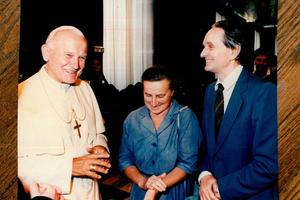St. Anthony of the Desert and the Three Divine Paradoxes
COMMENTARY: The life of St. Anthony of the Desert illustrates the great Christian paradox that God magnifies his glory not by diminishing his creatures, but by exalting them.

I suspect we celebrate saints’ birthdays to suppress our shock that the saints actually have them. A great gulf seems to exist between the lives of saints like St. Francis of Assisi and our own; and it is comforting to remember that at least we share with them the bizarre experience of birth, too easily forgotten if we but glance at their seemingly angelic existences.
St. Anthony of Egypt, whose memorial the Church celebrates Jan. 17, is another of the super saints, a man so holy as to seem almost inhuman. Alternately known as St. Anthony the Great, St. Anthony Abbot, St. Anthony of the Desert, St. Anthony the Anchorite and St. Anthony of Thebes, the saint’s most remarkable aspect of his feast day is not that it happened, but when it happened.
The Christian world in the third century was passing from the age of the martyrs to the age of the theologians. Witness was giving way to wonder. The pagans, who very much enjoyed slaying Christians, also enjoyed a rich theology and mythology concerning their gods. The Christian God, however, remained something of an enigma — so much so that even the early Christians weren’t quite sure what sort of enigma he was.
Into this age of speculation entered Anthony, who provided an answer in living long before Anselm would finally provide it in writing. St. Anthony of Egypt’s life explains what sort of god God is. And while St. Anthony of Padua is very popular today for helping us to find our car keys, I hope to make St. Anthony of Egypt equally popular for helping us to find God.
Not having space to provide a full biography, I restrain myself to the three paradoxes of his asceticism. First, Anthony “ate but once a day,” as told by his biographer, St. Athanasius. These meals consisted of only bread and water, amounting to little more than a dinner roll and a few fluid ounces.
Second, Anthony lived in extreme isolation; he once had himself sealed in a tomb to pray in total silence. His later years found him in a hermitage, a solid week’s walk from the nearest town.
Third, he was humorously undereducated. Having been converted to his vocation as a boy, he did not finish enough school to learn even reading. As concerns education, Anthony is the photo-negative of Augustine.
Anthony was a man who chose to live in dire poverty, but from this poverty arose his three divine paradoxes. He was extremely underfed, yet appeared in perfect health. Anthony stood a solid six-feet tall, his frame rippling with muscle. He maintained the appearance of youth throughout his 105 years. He was extremely isolated, yet he suffered the agony of popularity. His doors were “torn down by force.” The crowds gathered as they had before Christ. He was extremely ignorant, yet outsmarted the cream of Greece’s intelligentsia. Two Greek philosophers came to meet Anthony, and he asked why they wished to meet with a fool. When they replied that he was no fool, but wise and prudent, Anthony told them this: “If you think me prudent, become as I am, for we ought to imitate what is good. And if I had come to you, I should have imitated you; but if you to me, become as I am, for I am a Christian.” Having no desire to be converted, the philosophers departed in silence.
These paradoxes point, as do most paradoxes, straight back to the nature of God. Consider, for a moment, the life of the ascetic pagans. Siddhartha, on his way to becoming Buddha, ate but once a day and nearly died. St. Anthony ate but once a day and vigorously lived. Chris McCandless flew into the woods and was later found rotting and rather still. St. Anthony flew into the woods and was later found laughing and rather alive. Peter Abelard was known to be the smartest theologian of his age, yet he died a disgraced eunuch. St. Anthony was thought to be quite dim, yet he defeated the Platonic philosophers.
History is dotted with the drab, hunched figures of would-be mystics. History is also seasoned with the sharpness and sweetness of the saints.
What St. Anthony the Hermit reveals about the nature of God is that God is the sort of being who will create a St. Anthony. It has been said truly that: “There is a great man who makes every man feel small. But the real great man is the man who makes every man feel great.”
It is equally true that there is a great god who asks all men to be small. But the real great God asks all men to be great.
Chris McCandless had a god. It was a very small god, perhaps even a little devil, which called him out to the wilderness and killed him. St. Anthony had God, who called him out to the wilderness to live anew. He ate “but once a day,” yet he did not starve.
The world Anthony left was obsessed with prestige, power and influence. Yet, no matter how much he strived to avoid them, prestige, power and influence still found him out. The man who desired only God’s company had to endure the company of thousands: There is nothing so attractive as the man who does not wish to attract. Just as Anthony and Siddhartha both ate hardly anything but only the latter starved, so too did Anthony and Siddhartha both gain a following as spiritual leaders. However, while Siddhartha had to walk from town to town telling people he was enlightened; Anthony had the towns walk to him, for they knew he was a saint.
God, by whose grace Anthony flourished, is not a God challenged by his creatures. He is not a being like us, playing a zero-sum game. The whole of Christian metaphysics rests on a distinction so simple as to be understood by a child.
Every word written about God draws its energy from the erasing of a single letter. Jupiter was a being; Mars was a being; Aphrodite was a being. What the Church was discovering in the year 251 was that the Christian God is Being itself. By dropping “a,” the theologians found God. It was in giving up that they received.
It is impressive that N.T. Wright, with his years of study, has memorized the New Testament. It is more impressive that St. Anthony, with no study at all, memorized the whole Bible. It is impressive that T.E. Lawrence could brave the Arabian Desert for a few years of worldly war. It is more impressive that St. Anthony could brave the Egyptian desert for a lifetime of spiritual combat.
The enigma of St. Anthony is the end result of Christian theology. God is not a being in the world and can, thus, afford to see the world increase without losing any of his glory. He can delight in a man who increases in being, for God himself is being. To be more a man is to grow closer to God: “In him, we live and move and have our being.” St. Anthony simply lived and moved and had more being than most.
The pagan gods, being mere beings who nevertheless strive for equality with God, are on the same metaphysical shelf as man and must elbow and shove to make room. If a pagan decreases in glory, the gods increase in glory.
If a Christian increases in glory, God doesn’t lose any glory. After all: “Christ Jesus, who, though he was in the form of God, did not regard equality with God something to be grasped” (Philippians 2:6).
The Roman who castrated himself was honorable. The Christian who castrated himself was a heretic. What Origen couldn’t explain in writing, St. Anthony explained in living.
John Goerke is a writer living in St. Paul, Minnesota.
He is pursuing a master’s degree in Catholic studies
at the University of St. Thomas.
- Keywords:
- catholic faith
- hermit
- john goerke
- monasticism
- national catholic register
- paganism
- st. anthony of the desert
- st. athanasius
- theology
















